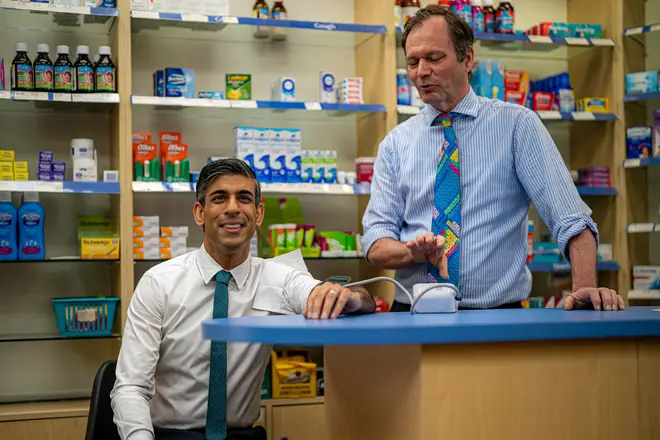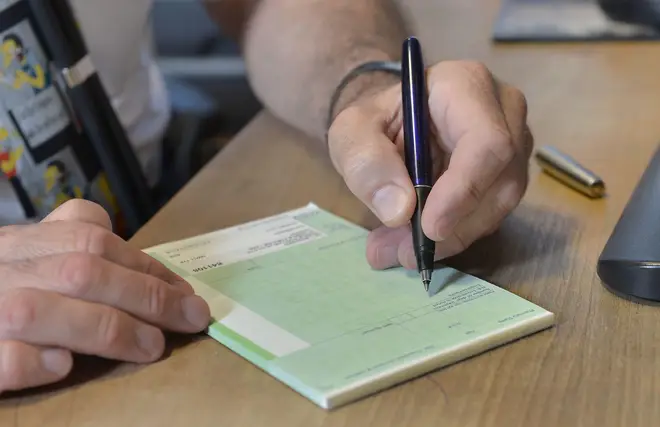
Paul Brand 10am - 12pm
9 May 2023, 08:00 | Updated: 9 May 2023, 12:34

Patients will be able to obtain some prescription medicines directly from pharmacies under a blueprint to ease the pressure on GP's surgeries.
Treatments for seven common conditions including earache, sore throat and urinary tract infections will be available without seeing a doctor under plans announced by Rishi Sunak.
But the plans have sparked concerns about how pharmacies will cope with the extra demand.
The Prime Minister hopes the measures will help end the "all-too stressful wait" for appointments by freeing up 15 million slots at doctors' surgeries over the next two years.

Pharmacists themselves would be able to write the prescriptions under the reform that ministers hope will be introduced this winter after a consultation with the industry.
Backed by £645 million of spending, the number of people able to access blood pressure checks in pharmacies would be more than doubled to 2.5 million a year under the plans.
Self-referrals will also be increased for access to services such as physiotherapy, hearing tests and podiatry without the requirement to see a GP first.
Mr Sunak announced the measures as he seeks to bounce back from the Conservatives' poor performance in last week's local elections, which saw the Tories shed 960 council seats.
"I am getting on with delivering on my five priorities and transforming primary care is the next part of this Government's promise to cut NHS waiting lists," he said.
"I know how frustrating it is to be stuck on hold to your GP practice when you or a family member desperately need an appointment for a common illness.
"We will end the 8am rush and expand the services offered by pharmacies, meaning patients can get their medication quickly and easily."
The Prime Minister has said he is registered with an NHS GP after acknowledging using private healthcare in the past. His family used to run a pharmacy in Southampton.
He outlined the plans as industry groups warned more pharmacies will close unless ministers provide more funding to the "struggling" sector.
It is hoped that almost half-a-million women would no longer need to speak to a nurse or GP to get oral contraception.
The other medications that GPs would be able to hand out would treat conditions including sinusitis, infected insect bite, impetigo and shingles.
NHS chief executive Amanda Pritchard said the "ambitious package" will help transform how care is provided within the health service.
"This blueprint will help us to free up millions of appointments for those who need them most, as well as supporting staff so that they can do less admin and spend more time with patients," she said.
Thorrun Govind, the chairwoman of the Royal Pharmaceutical Society in England, said the plans are a "real game-changer" for patients.
The proposals come on top of measures to make it easier to get GP appointments with online booking tools.
Shadow health secretary Wes Streeting said: "Expecting the Conservatives to fix this is like expecting an arsonist to put out the fire they started.
"Rishi Sunak is completely out of touch with the problems facing patients and the NHS. He has no plan to address the shortage of GPs, or to reverse the cut in the number of doctors trained every year. The Conservatives' announcement is merely tinkering at edges, in contrast to the fundamental reform the NHS needs and Labour is offering.
"Labour will abolish the non-dom tax status to train an extra 7,500 doctors and 10,000 nurses every year, so patients are seen on time again."
The King's Fund health think tank warned some pharmacies will not be able to offer the services because they may not have access to diagnostic tools, or sufficient staff and consultation rooms.
Senior fellow Beccy Baird said that "not all pharmacies will be able to offer these services and it will be really frustrating for patients to be bumped from pillar to post, only to end up back at the GP".
"Whilst any improvements to make it easier for people to access their local practices are welcome, to make the kinds of system changes needed to reform general practice, it is essential that, over the long-term, primary care is as much of a priority as reducing the hospital backlog," she added.
Lib Dem Health spokeswoman Daisy Cooper added: "Accessing faster care is critical for patients but ministers just don't seem to grasp the scale of the problem.
"Without a serious plan to recruit the pharmacists and GPs that our NHS needs, this could be yet another Conservative health pledge not worth the paper it's written on."